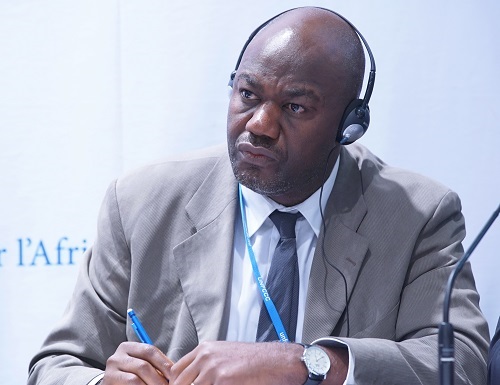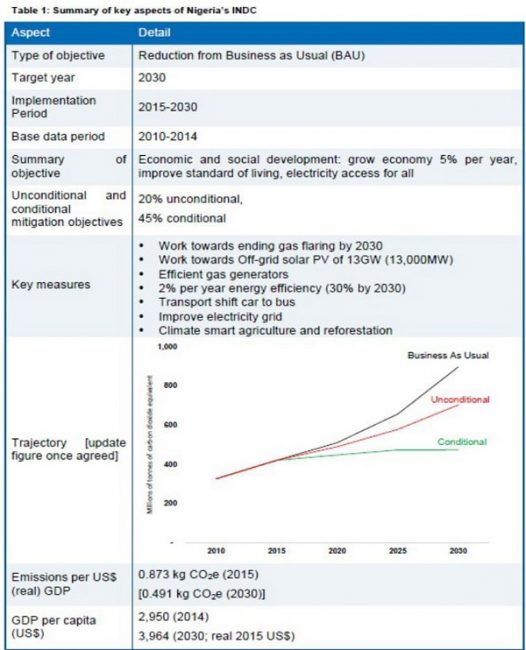Nigeria started the process of revising her Nationally Determined Contribution (NDC) in March 2020 year and is due to conclude the exercise in November. The result of the process will be a revised national pledge on climate action that will be submitted to the United Nations Framework Convention on Climate Change (UNFCCC) by the end of the year.

The NDCs are voluntary documents that governments agreed that Parties to the UNFCCC will submit to show what each government has committed to do in order to tackle climate change. Although the submission and commitment are voluntary; once a country submits their NDC, they are expected to keep the commitment or pledge made.
I am very delighted that the Centre for Climate Change and Development (CCCD) at Alex Ekwueme Federal University, Ndufu-Alike Ikwo (AEFUNAI), under my leadership, is implementing a World Resources Institute (WRI) funded project geared towards providing independent critical analysis and input into the revision process of Nigeria’s Nationally Determined Contribution (NDC).
The project is also intended to provide a platform for the general public to engage with, question, and make contribution to the country’s new NDC so that the document can truly help to drive sustainable green economic development for the country. This is a timely project which has the potential to make substantial impact in Nigeria’s and possibly Africa’s climate change policy and economic development more broadly.
Nigeria was among the 190 countries that submitted their Intended Nationally Determined Contributions (INDCs) to the UNFCCC in the run up to the COP meeting in Paris in 2015. Nigeria’s INDC has since been subsequently converted into the Nationally Determined Contribution (NDC) following the country’s ratification of the Paris Agreement in May, 2017.
A major challenge of the global climate governance is that the combined pledges made by the countries of the world fall far below what United Nations’ scientists say is needed to combat climate change. To address this emission reduction gap, countries agreed that they would review and enhance their NDCs every five years.
In its own original NDC, Nigeria committed itself to make 20% “unconditional emission reduction” of its Green House Gas emission by 2030 compared to the 2010 levels. Unconditional means that Nigeria pledged to reduce this amount of emission without any international support. Furthermore, Nigeria committed that it would increase her emission reduction to 45% by 2030 if help is received from the international development partners (see figure below).

Nigeria’s NDC is built on the appealing philosophy of pursing socioeconomic development while reducing carbon pollution. It also outlines a number of measures that government said it would take to meet the self-imposed targets. A strong emphasis was also placed on adaptation given Nigerian’s vulnerability to climate change.
There are several experts that consider Nigeria’s original NDC quite ambitious. There is therefore a need to question, in this revision process, whether Nigeria should increase its NDC ambition or not, more so given the huge socioeconomic impact of COVID-19 pandemic. Some might say that Nigeria ought to demonstrate leadership by ratcheting its ambition, while others might say that the priority for the country for now should be on rebooting its economic growth.
A critical question to ask is to what extent Nigeria has actually implemented the NDC that it pledged in 2015 and the environmental, social and economic benefits that have accrued to the country as a result. It is important to ensure that Nigeria is not simply making commitments it has no intention of achieving simply to please the developed countries that are financially supporting the NDC revision process.
In fact, some have noted that the preparation of the original NDC which started in late June 2015 was rushed to meet UNFCCC deadlines. One implication was that some of the data and analyses on which the NDC was based relied on grey literature and are judged very suspect. For example, in the absence of national emission registry, the emissions from most of the key sectors (energy, transport, and forestry) on which the NDC was based were best guess projections.
Another serious effect of the previous NDC preparation process was that it involved very limited public engagement. The consequence was that the country missed the opportunity to receive substantial inputs from critical stakeholders like businesses, parliamentarians and sub-national actors. Till date, many of these stakeholders have remained largely unaware of or had limited involvement in the implementation of the NDC.
Moreover, with limited public awareness of, and engagement with the development of the original NDC, there was not much from the civil society in the way of monitoring the implementation (or lack) of the NDC following its ratification in 2017.
The WRI funded project on “Promoting Public Engagement with Nigeria’s NDC Revision and Climate Action” implemented by CCCD at AEFUNAI is designed to help address these pertinent questions. The project is intended to increase public awareness of, and stakeholders’ engagement in, the revision and subsequent implementation of the revised NDC. It is also expected that the project will increase public awareness of climate change in Nigeria more broadly.
The project will help to widen the horizon of the discourse and strongly compliment the current government-led NDC revision process with the support of the NDC Partnership through the Climate Action Enhancement Package (CAEP), by injecting academic analysis and more public debate into the process.
The project will promote series of national virtual dialogues to provide opportunity to national and international experts to analyse various aspects of the NDC. The national dialogue will also be a platform for a range of various stakeholders to engage in the revision of the NDC as well as monitor its implementation.
The project will complement the government led process and help to open up the process to the participation of more stakeholders and the general public as well as help to increase public awareness of climate change more broadly.
Prof Chukwumerije Okereke is Director, Centre for Climate Change and Development (CCCD) at Alex Ekwueme Federal University, Ndufu-Alike Ikwo (AEFUNAI), Ebonyi State, Nigeria
